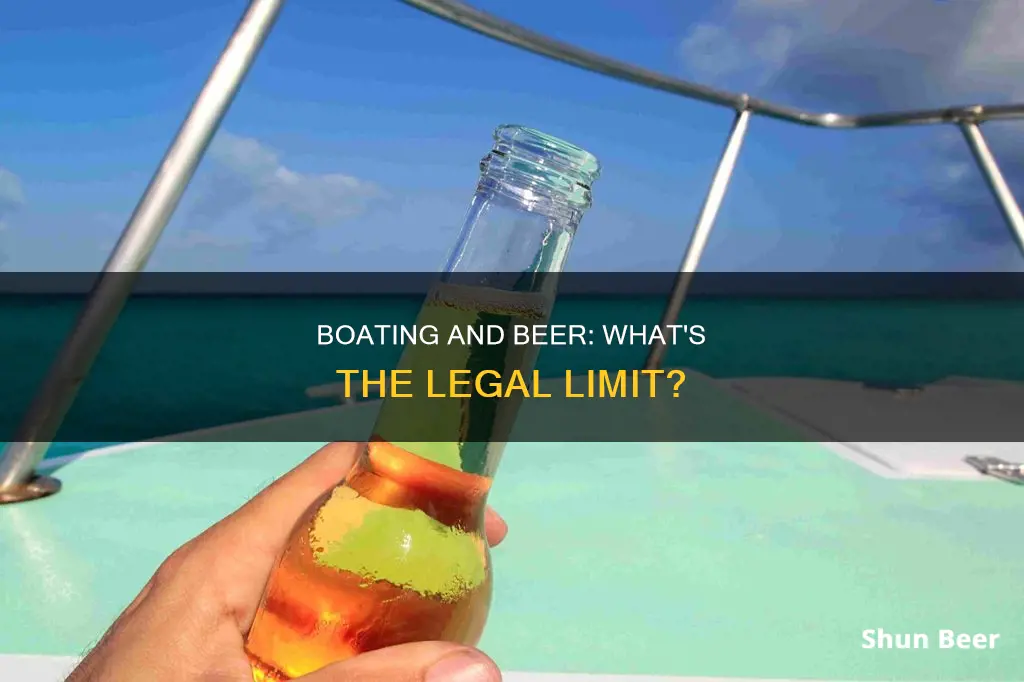
Drinking and boating is a combination that can have serious consequences. While it may not be illegal to drink and drive a boat in some places, it is certainly inadvisable. In the US, boating under the influence (BUI) is a federal offence, and all 50 states have laws regarding alcohol consumption and boat operation. In many states, the laws are similar to those for drinking and driving a car, with a legal limit of 0.08% blood alcohol concentration (BAC). However, in some states, the limit may be lower, and in Florida, for example, refusing to be tested for alcohol can lead to additional penalties. The effects of alcohol are intensified when out on the water, and it is a leading cause of boating fatalities.
Drinking Beer While Boating
| Characteristics | Values |
|---|---|
| Is drinking beer while boating illegal? | In the US, drinking beer while boating is illegal in all 50 states. In the UK, it is not illegal but is discouraged. |
| What are the penalties for drinking beer while boating? | Fines of up to $5,000, jail time, suspension of boating or driving privileges, loss of boating license, impact on insurance coverage, seizure or sale of the vessel. |
| What is the legal blood alcohol content (BAC) limit for boating? | In the US, the legal limit is a BAC of 0.08% g/dL, which is the same as for driving a car. |
| Can passengers drink beer while on a boat? | In the US, passengers who are not operating the boat and are over the age of 21 can legally drink beer while on a boat. |
What You'll Learn

Drinking and boating is dangerous and can have deadly consequences
The effects of alcohol consumption are well-known: it slows down bodily functions, lowers inhibitions, impairs decision-making, and slows reaction time and reflexes. These effects can be especially dangerous when operating a boat, as boating requires constant awareness of tides, currents, underwater obstacles, other boaters, people or objects in the water, and changing weather conditions. The open water provides none of the guidance of roads or lanes, making it all the more crucial for a boat operator to be alert and sober.
The legal consequences of drinking and boating should also be considered. Operating a boat while intoxicated is a federal offense in the US, with penalties including a $1,000 fine, criminal penalties of up to $5,000, and potential jail time. State laws may also impose additional penalties, such as suspension of boating or driving privileges, seizure or sale of the boat, and impact on driving records and insurance coverage. In some states, refusing to be tested for alcohol can lead to further penalties.
To ensure a safe and enjoyable boating experience, it is best to abstain from alcohol altogether. Boat operators should follow the same guidelines as those for alcohol consumption and driving a car, and passengers should also stay alert and sober to help keep everyone safe. By prioritizing safety and sobriety, boaters can reduce the risk of accidents, injuries, and fatalities.
Does Beer Expire? Drinking Beer Past Its Best Before Date
You may want to see also

In the US, boating under the influence is a federal offense
Drinking alcohol while boating is a topic that requires careful consideration, as it can have legal implications and impact safety. While the laws vary across different regions, it's important to recognize that boating under the influence of alcohol is a serious matter. In the US, operating a boat while intoxicated is a federal offense, and it's crucial to understand the potential consequences and safety risks associated with this action.
In the United States, the legal consequences of boating under the influence (BUI) can be severe. Firstly, it is essential to understand that BUI is a crime under federal and state laws. The U.S. Coast Guard and local law enforcement officers have the authority to enforce these laws and can arrest individuals for BUI, similar to driving a motor vehicle under the influence. This means that operating any watercraft, from canoes and rowboats to yachts, while impaired, is illegal.
The penalties for BUI can vary but often include significant fines and the suspension of boating privileges. In some cases, individuals may face imprisonment, especially if their actions result in property damage, injury, or death. The specific blood alcohol concentration (BAC) limit that constitutes BUI varies by state, with most states adhering to a limit of 0.08%, while Utah has a lower limit of 0.05%, and North Dakota has a higher limit of 0.10%. Regardless of the limit, it's important to recognize that alcohol impairs judgment and reaction time, increasing the risk of accidents.
To enforce BUI laws, law enforcement officials employ similar strategies to those used for driving under the influence (DUI) cases. They can pull over boats or vessels if they suspect impairment, and some states only require reasonable suspicion rather than probable cause. Additionally, checkpoints may be set up on the water, and patrols are often increased during holiday weekends, such as the Fourth of July, Memorial Day, and Labor Day, due to higher rates of intoxication.
It's worth noting that BUI laws are not limited to boats but can also apply to other watercraft, including diver propulsion vehicles. The consequences of a BUI conviction can extend beyond fines and imprisonment. A BUI conviction may result in a criminal record, and some states may report it to the department of motor vehicles, leading to driver's license suspension. Additionally, individuals may be required to complete boating safety courses, undergo substance abuse treatment, and face increased insurance rates for both boat and auto insurance.
In conclusion, boating under the influence is a federal offense in the US, and it is crucial to understand and abide by the laws to ensure the safety of everyone involved. The potential consequences of BUI are severe and can have long-lasting impacts on an individual's life. Therefore, it is always best to avoid operating a boat or any watercraft while under the influence of alcohol.
Beer Drinking on Atlantic Beach, NC: What's Allowed?
You may want to see also

Each US state has its own penalties for drinking and boating
Drinking and boating is a significant issue in the United States, with alcohol being a factor in approximately one-third of boating-related accidents and deaths. Operating a boat while impaired by alcohol is illegal in all 50 states, with each state enforcing its own penalties for those caught boating under the influence (BUI). These penalties can include large fines, possible jail time, and the loss of boating and driving privileges.
In most states, the legal blood alcohol limit for boating is 0.08%, which is the same as the limit for driving a car. However, some states, such as North Dakota and Wyoming, have a higher limit of 0.10%. The penalties for BUI vary depending on the state and the severity of the offense. For example, in Alabama, BUI is punishable by large fines and/or jail time, plus suspension of the operator's certification. In California, a BUI can result in large fines, jail time, and a possible suspension of the offender's driver's license.
The consequences of BUI can be severe, even for a first offense. For instance, in Washington State, a standard BUI is considered a gross misdemeanor and can result in a fine of up to $5,000 and a year in jail. If a BUI involves serious injury or death, the penalties are even more severe. In Washington, a BUI involving serious injury can be counted as "assault by watercraft" and is punishable by up to $20,000 in fines and ten years in jail. If a BUI results in death, the boat operator can be convicted of "homicide by watercraft," a Class A felony, with potential penalties of up to $50,000 in fines and life in prison.
It is important to note that the legal drinking age in the United States is 21, and the BUI laws and penalties apply only to those who are of legal drinking age. For those under 21, any amount of alcohol in their system while operating a boat would be illegal and could result in additional penalties.
The Art of Drinking Guinness: A Beginner's Guide
You may want to see also

Drinking and boating laws vary by country
In the United Kingdom, there is no specific legislation regarding drinking and boating, but local harbour masters may have bylaws in place. If an accident occurs, the involvement of alcohol is likely to exacerbate the situation. The UK government advises that it is best to avoid drinking altogether while operating a boat.
In Canada, impaired operation of a boat is an offense under the Criminal Code of Canada, and penalties can include prison time. Consumption of alcohol is permitted while anchored or docked, provided the vessel has fixed cooking, sleeping, and toilet facilities.
Regardless of the specific laws in your location, it is important to remember that drinking and boating can be dangerous. Alcohol impairs judgment, reaction time, and can lead to accidents. According to the US Coast Guard, alcohol is the leading known contributing factor in fatal boating accidents, and a boat operator with a BAC above 0.10% is estimated to be 10 times more likely to die in a boating accident than a sober operator. Therefore, it is always a good idea to leave alcohol consumption for when you are safely ashore.
Beer and Fluconazole: Is It Safe to Drink?
You may want to see also

Passengers can drink while boating
Drinking alcohol while on a boat is a common occurrence, with many people associating sailing with leisure and relaxation. If you are a passenger on a boat, there is no reason why you can't have a few alcoholic drinks, just as you might on other social occasions. After all, boating is often seen as an opportunity to unwind, take in the sights, and socialise with others on board.
However, it is important to note that drinking and boating can be a dangerous combination. According to the US Coast Guard, alcohol is the leading known contributing factor in fatal boating accidents. In 2016, alcohol was the primary factor in 15% of boating fatalities, and a boat operator with a blood alcohol concentration above 0.10% is estimated to be ten times more likely to die in a boating accident than a sober operator. The combination of sun and water can also cause alcohol to have a greater effect on individuals while boating.
In the United States, all 50 states have laws prohibiting the operation of a boat while intoxicated, with penalties including fines, criminal charges, and even jail time. The legal limit for drinking and boating is the same as for driving a car, with a blood alcohol concentration (BAC) of 0.08% g/dL. These laws apply to any boat, including canoes, kayaks, and rowboats.
Therefore, while passengers can legally drink while boating, it is important to do so responsibly and in moderation. Passengers should also stay alert and aware to help keep everyone safe on the water.
Melatonin and Beer: Safe Mix or Health Risk?
You may want to see also
Frequently asked questions
No, it is illegal to operate a boat while intoxicated in all 50 US states. The laws are similar to those for drinking and driving, with a legal limit of 0.08% blood alcohol concentration (BAC).
The penalties for boating under the influence (BUI) vary from state to state but can include a $1,000 fine, criminal penalties of up to $5,000, and even jail time. You could also lose your boating license, have your boat seized or sold, and face suspension of your driving license.
Yes, if you are not operating the boat, it is not illegal to drink alcohol. However, passengers should stay alert and aware to help keep everyone safe.
This depends on which country you are in. Many countries have laws that reflect those for drink-driving, so it's important to check the specific legislation of your destination.
Boating can be more hazardous than driving, especially when impaired by alcohol. Alcohol affects your balance, vision, and judgment, and these impairments are intensified on the water. It is estimated that a boat operator with a BAC above 0.10% is 10 times more likely to die in a boating accident than a sober operator.







